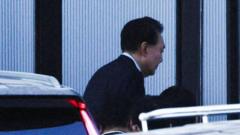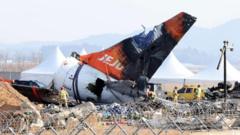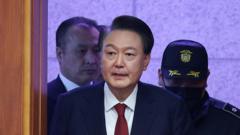In a historic and tumultuous turn of events for South Korean politics, President Yoon Suk Yeol has become the first sitting president in the nation's history to be arrested. His detention follows a prolonged stand-off with law enforcement while he is embroiled in a serious investigation concerning charges of insurrection, among others. Yoon’s controversial attempts to impose martial law led to a political upheaval, resulting in his impeachment by parliament.
Yoon Suk Yeol: South Korea's First President Arrested

Yoon Suk Yeol: South Korea's First President Arrested
South Korean President Yoon Suk Yeol faces unprecedented legal challenges after his arrest amid accusations of insurrection.
Despite currently being state president, his future holds uncertainty due to a pending ruling from the constitutional court regarding the validity of his impeachment. The arrest, executed in the early morning hours, utilized over 1,000 officers as they braved freezing temperatures and physical barricades erected by Yoon’s Presidential Security Service to accomplish the operation.
Yoon conveyed his decision to comply with the investigation in a brief video message aimed at preventing violence, despite calling the proceedings illegal. The arrest stems from his failure to respond to earlier summonses, prompting the Corruption Investigation Office (CIO) to obtain a legal warrant.
The political fallout has revealed sharp divisions within South Korean society. While supporters of the opposition have hailed the arrest as a triumph for justice, Yoon’s party has condemned the event as unconstitutional. Following his questioning, Yoon is expected to be detained at the Seoul Detention Centre unless a court intervenes within 48 hours to issue his release, leaving South Korea in a precarious political environment with an acting president, Finance Minister Choi Sang-mok, overseeing governance.
Demonstrations outside Yoon’s residence illustrate the country's polarized sentiments, showcasing both jubilant celebrations and anger from his supporters regarding what they perceive to be a breakdown of the rule of law. As South Korea wrestles with the implications of Yoon's unprecedented situation, the full scope of this deepening political crisis is yet to unfold.
In the larger narrative, Yoon’s martial law gambit signifies a drastic miscalculation and has thrust South Korea into a complex political crisis that raises fundamental questions about leadership and governance.
Yoon conveyed his decision to comply with the investigation in a brief video message aimed at preventing violence, despite calling the proceedings illegal. The arrest stems from his failure to respond to earlier summonses, prompting the Corruption Investigation Office (CIO) to obtain a legal warrant.
The political fallout has revealed sharp divisions within South Korean society. While supporters of the opposition have hailed the arrest as a triumph for justice, Yoon’s party has condemned the event as unconstitutional. Following his questioning, Yoon is expected to be detained at the Seoul Detention Centre unless a court intervenes within 48 hours to issue his release, leaving South Korea in a precarious political environment with an acting president, Finance Minister Choi Sang-mok, overseeing governance.
Demonstrations outside Yoon’s residence illustrate the country's polarized sentiments, showcasing both jubilant celebrations and anger from his supporters regarding what they perceive to be a breakdown of the rule of law. As South Korea wrestles with the implications of Yoon's unprecedented situation, the full scope of this deepening political crisis is yet to unfold.
In the larger narrative, Yoon’s martial law gambit signifies a drastic miscalculation and has thrust South Korea into a complex political crisis that raises fundamental questions about leadership and governance.




















